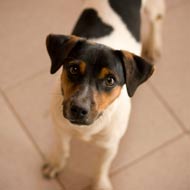Pet insurers have 'mixed views' on breed health risks

Some pet insurers quoted three, four or even five times more to insure particular breeds.
Pet insurance companies often have very different views on the potential health risks for each dog breed, according to a new survey by the Pet Insurance Guide.
Quotes were obtained from 16 leading pet insurance companies in September of this year. The survey explored the cost of insuring the 50 most popular pedigrees and mixed breeds.
The findings reveal mixed opinions on the health risks posed by each breed.
Some companies had a fairly flat pricing structure with a price difference of just a few pounds between premiums for each breed. Others companies, however, can charge three, four or even five times as much for some breeds as others.
One company quoted similar premiums for border collies and Jack Russell terriers, yet another wanted twice as much to insure a border collie, compared to a Jack Russell.
Overall, the survey found Jack Russells are the least expensive dog breed to insure, while dogue de bordeaux were the most expensive.
While it is often cheaper to insure crossbreed dogs, the survey shows that this is not always the case. For example, the average cost to insure a Jack Russell was less than that to insure a small mixed breed dog. And the average premium for a large mixed breed dog was about the same as the premium for a Labrador retriever.
Founder of the Pet Insurance Guide, Sally Hayward, warned that pet owners may end up paying far more than expected if they do not do their research.
“The survey results show that pet insurance companies also have different views of the risk posed by each breed of dog and adjust their premiums accordingly," she explained.
“This may mean that if pet owners do not take the time to research this complex market thoroughly before making their choice, they may not only find themselves without the vital cover they really need, but may also potentially be paying hundreds of pounds more each year than they need to."
For the full survey findings, visit: http://www.pet-insurance-guide.co.uk/blog/pet-insurance-dog-breeds-premium-survey/



 The Veterinary Medicines Directorate (VMD) is inviting applications from veterinary students to attend a one-week extramural studies (EMS) placement in July 2026.
The Veterinary Medicines Directorate (VMD) is inviting applications from veterinary students to attend a one-week extramural studies (EMS) placement in July 2026.